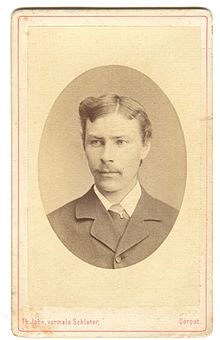Aleksander Late
Aleksander Läte (born January 12, 1860 in Pikasilla, today a rural community of Põdrala , Valga County , Estonia ; † September 8, 1948 in Tartu ) was an Estonian composer and piano maker .
life and work
Aleksander Läte was born in the village of Pikasilla (German Langebrücke ) in the former municipality of Aakre ( Ahagfer ) into the family of a tavern keeper . A lot of popular music was played in his father's inn. In Rõngu ( Ringen ), Aleksander Läte attended the parish school , which was very dedicated to musical education.
From 1876 to 1879 Läte studied at the renowned teacher training college of Jānis Cimze in Valga ( Walk ) in Livonia . From 1879 to 1883 Läte was a school teacher in Puhja , but devoted himself more and more to music. From 1883 to 1895 he worked as a sexton and organist in Nõo ( Nüggen ). As early as 1891 he directed the IV General Song Festival in Tartu. In 1895 he passed the entrance exam for the conservatory. Läte studied from the autumn of 1895 at the Conservatory in Dresden choral composition. In 1897 he completed his studies in Germany and returned to Livonia.
Late worked in Nõo until 1900 before moving to Tartu ( Dorpat ). There he quickly made a name for himself as a choir director, conductor, music teacher, piano and organ soloist that went beyond the borders of Livonia and Estonia . In 1900 Läte founded the first Estonian symphony orchestra in Tartu in what is now Estonia. He was the first professional music critic in Estonia and worked closely with the Postimees newspaper . He was friends with the composer Rudolf Tobias . Läte was patriotic and an active member of the Estonian Student Association ( Eesti Üliõpilaste Selts ).
After the death of his brother Eugen Sprenk-Läte in 1932, Läte managed the Sprenk-Läte piano factory founded by his brother and devoted himself to improving piano manufacturing in Estonia. He has also composed numerous pieces for choral singing, orchestral works and solo pieces. His works are often lyrical and romantic. He also wrote music theory works and hymn books.
Works (selection)
- Five cantatas
- Overture Kalevala (1901)
- Eesti tants (for symphony orchestra, 1904)
- Tempo di mazurka (for symphony orchestra, 1904)
literature
- Artur Vahter: Aleksander Late. Tallinn 1963
Web links
- Curriculum vitae, list of works with music examples, pictures (Estonian)
- Short biography (Estonian)
Individual evidence
- ↑ Eesti elulood. Tallinn: Eesti entsüklopeediakirjastus 2000 (= Eesti entsüklopeedia 14) ISBN 9985-70-064-3 , p. 266
- ↑ Heliloojad => Aleksander Läte ( Memento from October 7, 2008 in the Internet Archive )
| personal data | |
|---|---|
| SURNAME | Late, Aleksander |
| BRIEF DESCRIPTION | Estonian composer |
| DATE OF BIRTH | January 12, 1860 |
| PLACE OF BIRTH | Pikasilla, now Põdrala Rural Municipality , Valga County , Estonia |
| DATE OF DEATH | September 8, 1948 |
| Place of death | Tartu |
